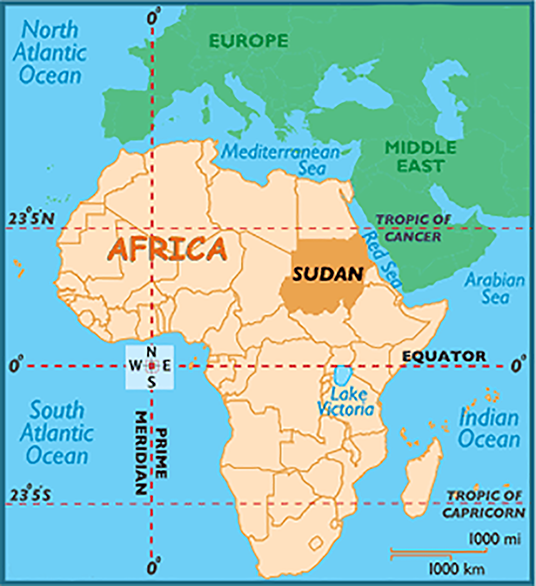Crisis in Sudan | 05 Jan 2022
For Prelims: Location of Sudan and its neighbours.
For Mains: Crisis in Sudan, reasons for it and way forward, History of upheavals in Sudan.
Why in News
Recently, Sudan’s civilian Prime Minister Abdalla Hamdok resigned, plunging the country into further turmoil.
- Mr. Hamdok, who was sacked by the military in October 2021 and reinstated a few weeks later as part of a deal, stepped down as anti-military protests continued to rock the country.
- Sudanese pro-democracy groups rejected Mr. Hamdok’s deal with the military and demanded the Generals hand over power to an independent civilian authority.
Key Points
- Unstable Sudan:
- Sudan is at a familiar deadlock, subject to the whims of a brutal military regime after a coup. On a continent with a bad record in this respect, Sudan is in a class of its own, with six coups and 10 failed attempts since independence in 1956.
- Since independence Sudan has been governed, with only occasional breaks, by an Arab elite in Sudan, bent on plundering the country’s considerable wealth at the expense of its people.
- Their rule, exercised through the army, has been cloaked in the language of Islam; it is really a kleptocracy.
- Kleptocracy is a government whose corrupt leaders use political power to appropriate the wealth of their nation, typically by embezzlement or misappropriation of government funds at the expense of the wider population.
- The consequence is a country beset by wars and conflict between the centre and the immiserated peripheries. The army and its allied militias, notably the Rapid Support Forces, have used their power to carve out swathes of the economy for themselves, well beyond defence industries.
- Civilian rule, bringing transparency, as well as democracy, would threaten those financial interests.
- The victims of decades of misrule are ordinary Sudanese. Facing inflation rates of over 100%, almost a quarter of the population can barely feed themselves and millions live in refugee camps.
- By contrast, the elites seem to get by. Therefore the elites will fight to preserve the status quo.
- Current Crisis:
- The churn has accelerated since General Omar al-Bashir, indicted for genocide, was toppled by a popular revolution in April 2019.
- Subsequently, the Sovereignty Council, an 11-member body comprising military and civilian leaders that replaced the military-led transition council, appointed Mr. Hamdok as Prime Minister.
- During the Sovereignty Council’s rule, Sudan entered into a peace deal with rebel groups, banned female genital mutilation, made peace with Israel and reached out to international powers for economic assistance.
- During this period, the U. took the country off the list of state sponsors of terrorism. Reforms at home and international recognition suggested that Sudan was on a slow but steady transition into full democracy.
- The army struck back almost immediately, killing scores of people. An uneasy alliance of generals and technocrats, headed by Mr Hamdok, governed from August 2019 up to the coup October 2021.
- That so-called transitional government was supposed to pave the way to elections. They now look further off than ever.
- Since the recent coup (2021) the protestors have been protesting against the coup and for a democratic government.
- Russia and China Angle:
- Russia’s Supplies:
- An added complication is Russia’s support for the generals. Wagner, a mercenary outfit acting in the interests of Russia, has supplied training for militias and other goodies.
- Russia has also shielded Sudan at the United Nations(UN), playing its usual spoiler role against the West.
- China’s Investments:
- China’s extensive investments in Sudan have also afforded army protection; China favours stability over good governance.
- Russia’s Supplies:
Way Forward
- The military is now in a difficult position. Given that the civil-military relationship is already at a breaking point.
- The UN estimates that at least a third of the country’s 43 million people will need humanitarian assistance in 2022. What Sudan wants is a stable, responsive government that can urgently address the myriad problems the country faces.
- Ultimately, the price of a successful transition to democracy, which will have to include structural economic reforms, will likely entail some distasteful compromises on issues such as accountability and retention of Bashir-era assets.
- There should be a meaningful dialogue” between all Sudanese parties to “reach an inclusive, peaceful and lasting solution.
- But a genuine transition should also prevent the military from continuing to act as the country’s ultimate authority, able to reset timetables and remove governing officials at will.

